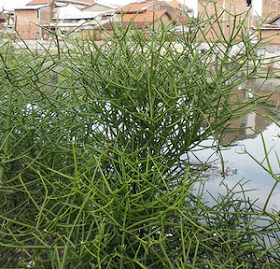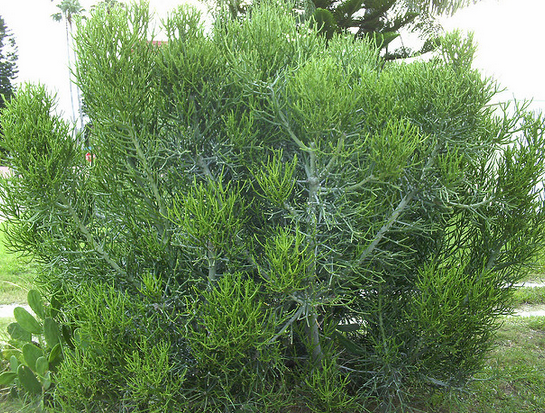Pencil tree
(Pedilanthus pringlei) is an Evergreen shrub that grows plants upright. Its
height is 2-6 m tall with a base of woody, branched, and Gummy like a toxic
milk. Pencil tree (Pedilanthus pringlei) has a branch that round
cylindrical-shaped pencil, smooth horizontal grooved, and green. After growing
an inch, will branch off the two transverse standing, and so on so that it
looks like a fork.
Pencil tree
(Pedilanthus pringlei) shaped like twigs without leaves, plant this one is
often used as an ornamental plant as one of the grounds. But behind the
uniqueness of shape, Pencil tree (Pedilanthus pringlei) turns out to be
harboring a variety of benefits for health especially in traditional medicine.
Almost all
parts of the Pencil tree (Pedilanthus pringlei) can be utilized for health.
Root and twig Pencil tree (Pedilanthus pringlei) for example, can cure stomach
aches, rheumatism, bone pain, syphilis (venereal disease caused by bacteria),
hemorrhoids, Ulcer of the nasal cavity, and nerve pain. While the stem wood
Pencil tree (Pedilanthus pringlei) can heal several skin diseases, leprosy, as
well as numbness in hands and feet.
Results of
a study from Nishi Gupta (Journal of Pharmacognosy and Phytochemistry 2013)
mentioned that the benefits of the Pencil tree (Pedilanthus pringlei) very big
in the world of health as an anti bacterial, anti, antikarsinogen disease,
antimicrobial, and can control the parasite in the intestine, overcoming
asthma, coughs, rheumatism, cancer, tumors of the skin as well as other
diseases that make these plants ought to be considered as one of the medical
plants.
Pencil tree
(Pedilanthus pringlei) with another name pencil cactus milkbush or it can also
be used as anticancer agents because it can suppress the immune system that
causes tumor growth so it doesn't develop into one of the types of cancer.
Behind a
wide array of benefits to health, Pencil tree (Pedilanthus pringlei) is one of
the many shrubs that have uniqueness on the part of the body that has shaped
many branches broken and has a milk-like sap is toxic. Content of toxins on the
sap of this is what makes tropical plants from Africa this is have a tendency
to not attacked disease and pests so easily kept.
The sap of the plant Pencil tree (Pedilanthus pringlei) are highly toxic so if splatter can cause irritation of the eyes, and can cause a sense of heat and burn as well as inducing vomiting if ingested. When the sap is toxic in contact with the eyes can cause temporary blindness, then for several days with symptoms will deteriorate after 12 hours if not immediately addressed.
Pencil tree
(Pedilanthus pringlei) and set it on fire to ward off mosquitoes (natureterapi,
2012). In addition the plant often used to poison fish can also be used in a
variety of leather industry clothing, timber can be used for toys while the
charcoal for gunpowder.




